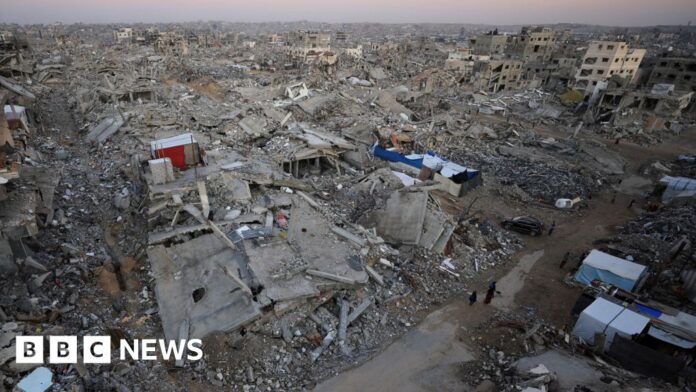The UN Security Council has voted in favour of a US-drafted resolution that endorses US President Donald Trump’s 20-point plan for Gaza.
Included in the plan is the establishment of an International Stabilisation Force (ISF), to which, the US says, multiple unnamed countries have offered to contribute.
The resolution was backed by 13 countries – including the UK, France and Somalia – with none voting against the proposal. Russia and China abstained.
Adopting it was an “important step in the consolidation of the ceasefire,” a spokesperson for UN Secretary-General Antonio Guterres said. Hamas has rejected the resolution, saying it fails to meet Palestinians’ rights and demands.
Writing on Telegram after the resolution passed, Hamas said the plan, “imposes an international guardianship mechanism on the Gaza Strip, which our people and their factions reject”.
“Assigning the international force with tasks and roles inside the Gaza Strip, including disarming the resistance, strips it of its neutrality, and turns it into a party to the conflict in favour of the occupation,” it added.
Under the resolution, the ISF will work with Israel and Egypt, along with a newly trained and vetted Palestinian police force, to help secure border areas and ensure the process of permanently disarming non-state armed groups, including Hamas.
Until now, the police there have operated under the authority of Hamas.
Mike Waltz, the US’s ambassador to the UN, told the Council that the ISF would be “tasked with securing the area, supporting the demilitarization of Gaza, dismantling the terrorist infrastructure, removing weapons, and ensuring the safety of Palestinian civilians”.
The Security Council also approved the creation of a transitional governance body called the Board of Peace (BoP), which would supervise governance of a Palestinian technocratic, apolitical committee and oversee the reconstruction of Gaza and the delivery of humanitarian aid.
Financing for reconstruction of Gaza following two years of war would come from a trust fund backed by the World Bank, according to the resolution.
Under the resolution, both the ISF and the BoP would work alongside a Palestinian committee and police force.
Trump called the Security Council vote “historic” and said it was a way of “acknowledging and endorsing” the BoP, with its final membership to be announced soon. He is expected to chair it.
“This will go down as one of the biggest approvals in the History of the United Nations, will lead to further Peace all over the World, and is a moment of true Historic proportion!” he wrote on his Truth Social platform.
Unlike earlier drafts, the resolution references a credible pathway to Palestinian self-determination and statehood. It is language several council members pushed for.
Israel strongly opposes the creation of a Palestinian state, a significant hurdle in the path to future statehood. Key Arab states had pressured drafters of the resolution to include Palestinian self-determination in the text.
The UN Secretary-General’s spokesperson stressed that the resolution needed to “translate… into concrete and urgently needed steps on the ground” and lead to “a political process for the achievement of the two-State solution”.
The US, the Palestinian Authority, and several Arab and Muslim-majority nations including Egypt, Saudi Arabia and Turkey have called for the quick adoption of the resolution.
The Palestinian Authority (PA) said in a statement that the resolution’s terms needed to be implemented “urgently and immediately”.
Russia and China did not exercise their vetoes, but abstained to allow the resolution to pass, largely because the PA and eight other Arab and Muslim nations backed it.
Both Moscow and Beijing criticised the resolution. They said there was little clarity about the key mechanisms’ composition, that it did not ensure the participation of the UN, and that it failed to explicitly reiterate a firm commitment to the two-state solution.
The initial phase of the plan – a ceasefire between Israel and Hamas and the handing over of hostages and detainees – came into force on 10 October. Waltz described it as a “fragile, fragile first step”.
Trump’s peace plan in effect suspended the fighting between Israel and Hamas which had raged since Hamas-led gunmen attacked Israel on 7 October 2023. About 1,200 people were killed and 251 taken hostage in that attack.
More than 69,483 Palestinians have been killed by Israeli military action in Gaza since then, according to the Hamas-run health ministry.


